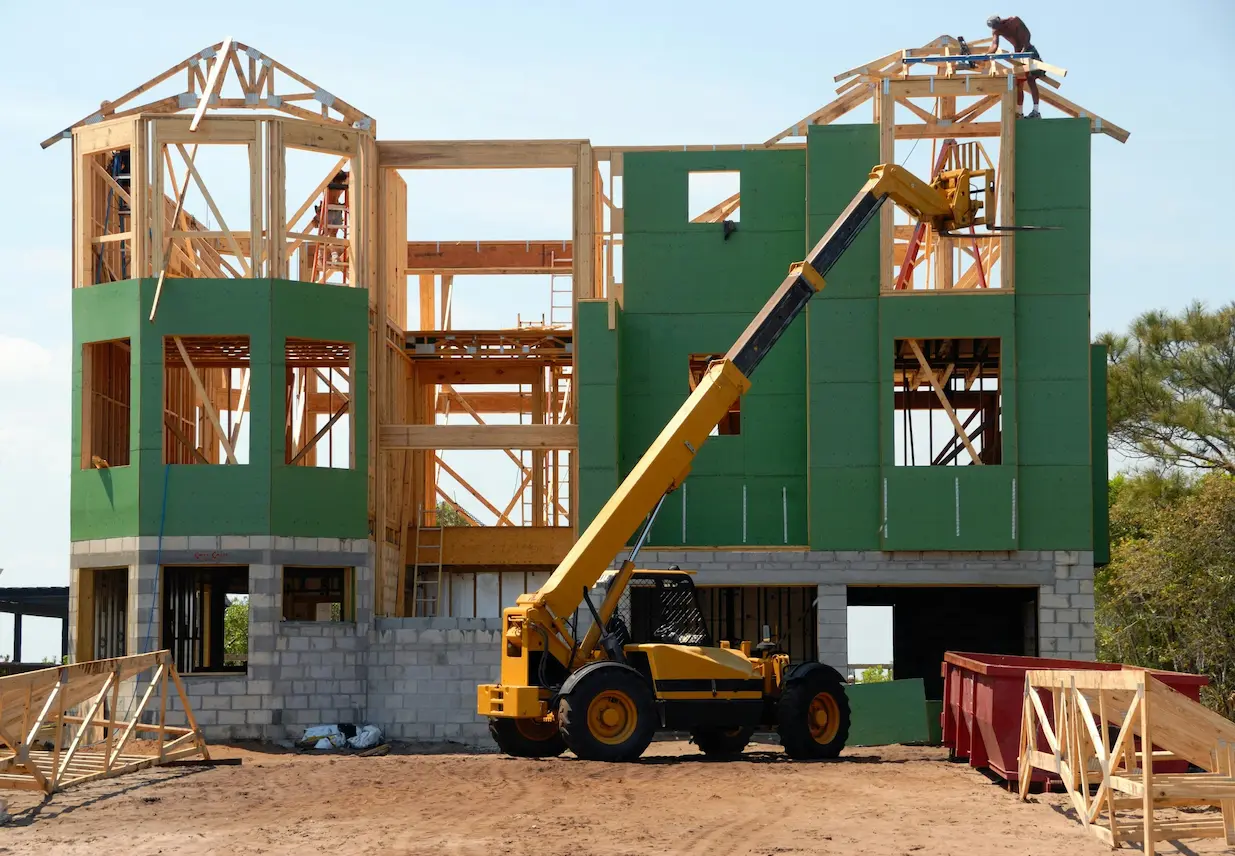
Wondering how to protect your construction project? Self-construction insurance is a must to avoid unpleasant surprises during the work. It gives you peace of mind if there’s any damage or injuries on the construction site.
We know that building a house can be stressful, but don’t worry! This article will guide you to understand what you need to check to insure your project safely.
Understanding Home Insurance During Construction
Do I need to insure my house during construction?
Yes, and it’s important! Even if the contractor (builder) must have their civil liability insurance, you, as the owner, must take the initiative and request a home insurance quote. As soon as construction begins, consider taking out construction insurance (also called “all risks construction” or HEC).
This policy covers direct damages – fire, theft, water infiltration – until work completion, particularly when reaching the weathertight stage (roof, doors, windows installed). This type of insurance is essential to protect the building, your materials, and what’s incorporated into the construction before regular home insurance takes effect.
What are the regulations regarding this situation?
In Quebec, home insurance is not legally mandatory, but once your construction reaches the weathertight stage, this insurance becomes essential, according to insurers’ best practices. You must also subscribe to builder’s risk insurance, a guarantee aimed at pre-financing repair of defects from the start of construction, often required by lenders.
Why Have Home Insurance During Construction?
Unexpected Events During Work
Here are four major risks that can occur during your property construction:
- Delays caused by adverse weather conditions or supply problems
- Design errors requiring costly modifications during construction
- Natural disasters like floods or storms damaging the building
- Material damage due to accidents or vandalism on site
Self-construction insurance protects you against these unexpected events. It covers breakages, injuries, and other accidents that may occur during your work.
Owner’s Civil Liability
As an owner, you must subscribe to civil liability insurance. This measure protects you if you cause bodily injury or property damage to third parties on your construction site. Contractors must also have their own liability insurance contract. This offers additional protection for the site and for you in case of problems. Always verify that your contractors are properly insured before starting work.
Meeting Lender and Municipal Requirements
Banks and Quebec municipalities often require proof of insurance before granting a loan or construction permit. This requirement ensures your project complies with legal standards.
Protection of Your Materials and Tools
Here are the essential elements to protect on your construction site:
- Expensive materials like wood, windows, or exterior cladding
- Heavy equipment such as excavators or cranes
- Professional tools like power saws or compressors
- Safety devices including scaffolding and protective barriers
To limit theft or vandalism risks, install alarms and good lighting. These preventive measures will reduce your expenses related to potential claims. Appropriate insurance will help cover losses in case of problems.
How to Handle a Claim During House Construction?
Ensuring Safety First
Protecting people and the construction site is paramount. Here are immediate measures to take:
- Evacuate quickly if necessary
- Cut off electricity to avoid additional risks
- Check structure stability with a professional
- Prevent any worsening by securing the affected area
- Contact emergency services if the situation requires
Gathering Evidence and Documents
To properly document the claim, you must:
- Take detailed photos and videos of the damage
- Keep all quotes and invoices related to the incident
- Note every important detail in a report
- Carefully preserve proof of expenses incurred
These steps will help build a solid case. Photos will serve as visual evidence, while invoices will support your reimbursement requests. If you have questions, consult your insurer for additional advice.
Contact Your Broker (or Insurer) to Make a Claim
As soon as possible after the incident, communicate with your broker or insurer. This quick action speeds up your case processing. The insurer will assess damage to your home and determine the compensation you’re entitled to as an insured.
In case of significant building damage, your house under construction will receive special attention. Don’t hesitate to ask all your questions about the procedure.
During this period, which can be long and complex, a good insurance plan will help protect you against numerous unexpected events. Stay in regular contact with your insurer to navigate this delicate stage of your construction project.
Compare Home Insurance Quotes Today!
Looking for the best protection for your house under construction? Gendron Assurance offers personalized support. We compare options to find you ideal coverage. Fill out our home insurance form now for a free, customized quote!
Frequently Asked Questions About House Construction Insurance
How to choose the right home insurance for a self-construction project?
For your self-construction project, adequate insurance is essential. It protects you against potential unexpected events. Civil liability covers damage caused to others. The all-risks construction option guarantees your materials and site. People doing self-construction can benefit from an owner-occupant policy. Don’t forget to update your contract once work is completed.
What to do if vandalism occurs on my construction site?
Your all-risks construction insurance covers material damage related to vandalism. Civil liability handles potential conflicts. You can also insure your materials against theft and deterioration. We recommend installing preventive systems to reduce your premiums and minimize risks.
Can I protect my subcontractors or volunteers?
The contractor’s civil liability insurance covers errors or damage caused by their workers. Appropriate coverage for volunteers and subcontractors is wise. Your owner-occupant policy can be modified to include protection for people working on the site.
